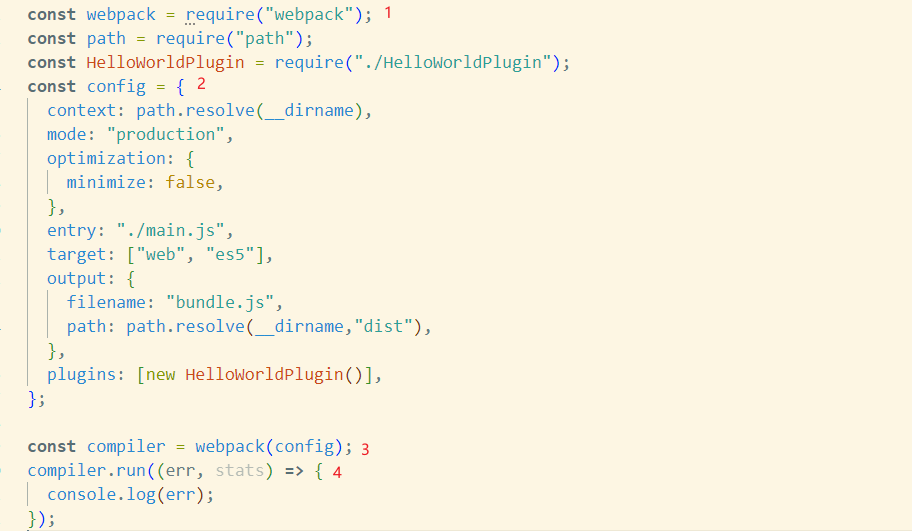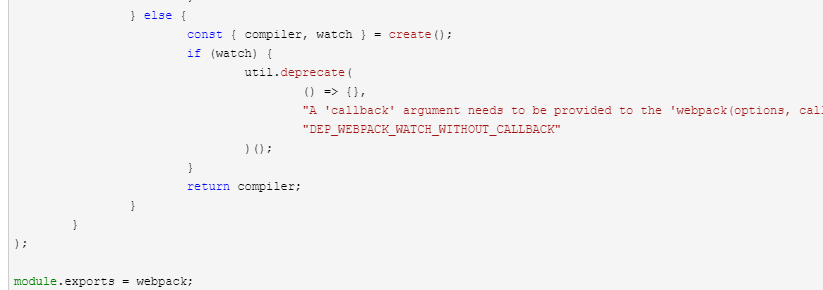背景
- 什么是tapable、hook,平时做vue开发时的webpack 配置一直都没弄懂,你也有这种情况吗?
- 还是看源码,闲来无聊又看一下webpack的源码,看看能否找到一些宝藏
- tapable和webpack没有特定关系,可以先看下这篇文章,了解下这个小型库 https://webpack.docschina.org/api/plugins/#tapable https://blog.csdn.net/mafan121/article/details/113120081 4.下面记录下寻宝过程
开始
执行一次webpack经历了什么,先看一下代码

我们分析一下4点
- 引用了webpack
- 我们使用的配置文件
- 调用webpack函数,传入配置,返回一个compiler(编译器)
- 执行编译器的run方法
分析
引用webpack,先把这个函数找出来
https://github.com/webpack/webpack/blob/main/package.json
"main": "lib/index.js",
https://github.com/webpack/webpack/blob/main/lib/index.js
module.exports = mergeExports(fn, {
get webpack() {
return require("./webpack");
},
https://github.com/webpack/webpack/blob/main/lib/webpack.js
const webpack = /** @type {WebpackFunctionSingle & WebpackFunctionMulti} */ (
/**
* @param {WebpackOptions | (ReadonlyArray<WebpackOptions> & MultiCompilerOptions)} options options
* @param {Callback<Stats> & Callback<MultiStats>=} callback callback
* @returns {Compiler | MultiCompiler}
*/
(options, callback) => {
const create = () => {
if (!asArray(options).every(webpackOptionsSchemaCheck)) {
getValidateSchema()(webpackOptionsSchema, options);
util.deprecate(
() => {},
"webpack bug: Pre-compiled schema reports error while real schema is happy. This has performance drawbacks.",
"DEP_WEBPACK_PRE_COMPILED_SCHEMA_INVALID"
)();
}
/** @type {MultiCompiler|Compiler} */
let compiler;
let watch = false;
/** @type {WatchOptions|WatchOptions[]} */
let watchOptions;
if (Array.isArray(options)) {
/** @type {MultiCompiler} */
compiler = createMultiCompiler(
options,
/** @type {MultiCompilerOptions} */ (options)
);
watch = options.some(options => options.watch);
watchOptions = options.map(options => options.watchOptions || {});
} else {
const webpackOptions = /** @type {WebpackOptions} */ (options);
/** @type {Compiler} */
compiler = createCompiler(webpackOptions);
watch = webpackOptions.watch;
watchOptions = webpackOptions.watchOptions || {};
}
return { compiler, watch, watchOptions };
};
if (callback) {
try {
const { compiler, watch, watchOptions } = create();
if (watch) {
compiler.watch(watchOptions, callback);
} else {
compiler.run((err, stats) => {
compiler.close(err2 => {
callback(err || err2, stats);
});
});
}
return compiler;
} catch (err) {
process.nextTick(() => callback(err));
return null;
}
} else {
const { compiler, watch } = create();
if (watch) {
util.deprecate(
() => {},
"A 'callback' argument needs to be provided to the 'webpack(options, callback)' function when the 'watch' option is set. There is no way to handle the 'watch' option without a callback.",
"DEP_WEBPACK_WATCH_WITHOUT_CALLBACK"
)();
}
return compiler;
}
}
);
module.exports = webpack;
这里主要就是调用create创建一个Compiler(先不理watch)

在看一下create,这里是调用的createCompiler或者createMultiCompiler

在看一下createCompiler,这里主要就是new一个Compiler。这个时候已经开始了webpack编译的生命周期。
/**
* @param {WebpackOptions} rawOptions options object
* @returns {Compiler} a compiler
*/
const createCompiler = rawOptions => {
const options = getNormalizedWebpackOptions(rawOptions);
applyWebpackOptionsBaseDefaults(options);
const compiler = new Compiler(options.context, options);
new NodeEnvironmentPlugin({
infrastructureLogging: options.infrastructureLogging
}).apply(compiler);
if (Array.isArray(options.plugins)) {
for (const plugin of options.plugins) {
if (typeof plugin === "function") {
plugin.call(compiler, compiler);
} else {
plugin.apply(compiler);
}
}
}
applyWebpackOptionsDefaults(options);
compiler.hooks.environment.call();
compiler.hooks.afterEnvironment.call();
new WebpackOptionsApply().process(options, compiler);
compiler.hooks.initialize.call();
return compiler;
};
我们简单看一下Compiler类的一些hooks
const {
SyncHook,
SyncBailHook,
AsyncParallelHook,
AsyncSeriesHook
} = require("tapable");
......
class Compiler {
/**
* @param {string} context the compilation path
* @param {WebpackOptions} options options
*/
constructor(context, options = /** @type {WebpackOptions} */ ({})) {
this.hooks = Object.freeze({
/** @type {SyncHook<[]>} */
initialize: new SyncHook([]),
/** @type {SyncBailHook<[Compilation], boolean>} */
shouldEmit: new SyncBailHook(["compilation"]),
/** @type {AsyncSeriesHook<[Stats]>} */
done: new AsyncSeriesHook(["stats"]),
/** @type {SyncHook<[Stats]>} */
afterDone: new SyncHook(["stats"]),
/** @type {AsyncSeriesHook<[]>} */
additionalPass: new AsyncSeriesHook([]),
/** @type {AsyncSeriesHook<[Compiler]>} */
beforeRun: new AsyncSeriesHook(["compiler"]),
/** @type {AsyncSeriesHook<[Compiler]>} */
run: new AsyncSeriesHook(["compiler"]),
/** @type {AsyncSeriesHook<[Compilation]>} */
emit: new AsyncSeriesHook(["compilation"]),
/** @type {AsyncSeriesHook<[string, AssetEmittedInfo]>} */
assetEmitted: new AsyncSeriesHook(["file", "info"]),
/** @type {AsyncSeriesHook<[Compilation]>} */
afterEmit: new AsyncSeriesHook(["compilation"]),
每个hook都是一个 tapable包里对应后hook的实例
在回到创建编译器那里,这时创建一个插件的实例,并且执行apply方法,插件就会向自己关系的hook添加事件处理函数(其实还是一个事件监听),NodeEnvironmentPlugin代码可以自行在源码中查看
new NodeEnvironmentPlugin({
infrastructureLogging: options.infrastructureLogging
}).apply(compiler);
一切都准备好了之后,我们再看一下编译器的run方法
/**
* @param {Callback<Stats>} callback signals when the call finishes
* @returns {void}
*/
run(callback) {
if (this.running) {
return callback(new ConcurrentCompilationError());
}
let logger;
const finalCallback = (err, stats) => {
if (logger) logger.time("beginIdle");
this.idle = true;
this.cache.beginIdle();
this.idle = true;
if (logger) logger.timeEnd("beginIdle");
this.running = false;
if (err) {
this.hooks.failed.call(err);
}
if (callback !== undefined) callback(err, stats);
this.hooks.afterDone.call(stats);
};
const startTime = Date.now();
this.running = true;
const onCompiled = (err, compilation) => {
if (err) return finalCallback(err);
if (this.hooks.shouldEmit.call(compilation) === false) {
compilation.startTime = startTime;
compilation.endTime = Date.now();
const stats = new Stats(compilation);
this.hooks.done.callAsync(stats, err => {
if (err) return finalCallback(err);
return finalCallback(null, stats);
});
return;
}
process.nextTick(() => {
logger = compilation.getLogger("webpack.Compiler");
logger.time("emitAssets");
this.emitAssets(compilation, err => {
logger.timeEnd("emitAssets");
if (err) return finalCallback(err);
if (compilation.hooks.needAdditionalPass.call()) {
compilation.needAdditionalPass = true;
compilation.startTime = startTime;
compilation.endTime = Date.now();
logger.time("done hook");
const stats = new Stats(compilation);
this.hooks.done.callAsync(stats, err => {
logger.timeEnd("done hook");
if (err) return finalCallback(err);
this.hooks.additionalPass.callAsync(err => {
if (err) return finalCallback(err);
this.compile(onCompiled);
});
});
return;
}
logger.time("emitRecords");
this.emitRecords(err => {
logger.timeEnd("emitRecords");
if (err) return finalCallback(err);
compilation.startTime = startTime;
compilation.endTime = Date.now();
logger.time("done hook");
const stats = new Stats(compilation);
this.hooks.done.callAsync(stats, err => {
logger.timeEnd("done hook");
if (err) return finalCallback(err);
this.cache.storeBuildDependencies(
compilation.buildDependencies,
err => {
if (err) return finalCallback(err);
return finalCallback(null, stats);
}
);
});
});
});
});
};
const run = () => {
this.hooks.beforeRun.callAsync(this, err => {
if (err) return finalCallback(err);
this.hooks.run.callAsync(this, err => {
if (err) return finalCallback(err);
this.readRecords(err => {
if (err) return finalCallback(err);
this.compile(onCompiled);
});
});
});
};
if (this.idle) {
this.cache.endIdle(err => {
if (err) return finalCallback(err);
this.idle = false;
run();
});
} else {
run();
}
}
https://github.com/webpack/webpack/blob/main/lib/Compiler.js
这里简单分析一下,主要就是执行run相关生命周期,以及编译。并且编译完成后传入回调函数onCompiled
const run = () => {
this.hooks.beforeRun.callAsync(this, err => {
if (err) return finalCallback(err);
this.hooks.run.callAsync(this, err => {
if (err) return finalCallback(err);
this.readRecords(err => {
if (err) return finalCallback(err);
this.compile(onCompiled);
});
});
});
};
整体逻辑不是很复杂,我们主要可以感受到webpack启动后对hook的一些使用方式。整体的逻辑差不多都是一样的。是不是很简单。
总结
- 想了解一个框架,一定要找到入口函数,一点一点向前探索。
- tapable 是个好东西,
- 关于webpack生命周期,有疑问的时候,除了看文档意外,还可以结合源码去理解,去感受
你学会了吗?欢迎留下你的感受!
标签:

留言评论